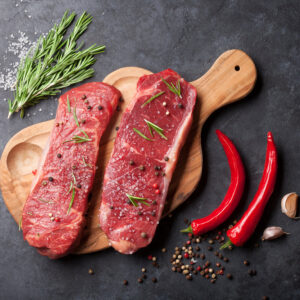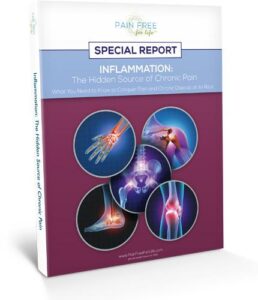
If your mouth waters at the thought of a hot and juicy steak right off the grill, you’re not alone. It’s been reported that Americans consumed 27.3 billion pounds of beef in 2019 alone!
But, if you’re not paying attention to the diet-inflammation connection—especially when it comes to meat—you may be shocked at what you find out!
As a pillar of the Hache Protocol, we believe proper nutrition is essential to achieving long-term relief from chronic pain. In this blog, we’ll look at how your dinner might be sabotaging your healing.
Inflammation and Your Diet
There is growing evidence to support the idea that certain foods promote a harmful inflammatory response. Refined sugars, processed cereals, certain meats, and refined vegetable oils have all been found to be components of an inflammatory diet.
Today, we’re examining why meat causes inflammation and providing some simple actions you can take to minimize that risk and start feeling better sooner.
Meat—A Dietary Staple for Eons
Eating meat as a dietary staple is deeply engrained in human culture and is a practice that dates to our earliest ancestors. The popular Paleo diet pays homage to the integral role this food has played in human survival.
But just because we’ve always done something one way doesn’t mean we don’t need to innovate and evolve as our caveman ancestors did so many years ago.
A Dietary Revolution is Afoot
In recent history, we have made drastic advancements in understanding the role diet plays in our health. The result is a dietary revolution that transforms the way we think about food as we know it.
For Example: Did you know that 70% of your immune system is in your gut? The correlation between diet and inflammation is undeniable and backed by science! More on that to come…
Vegans on the Rise!

These days, veganism is on the rise! The health-conscious are now looking to cut down the amount of meat they eat or are going meat-free all together. As many as 6% of U.S. consumers report themselves as vegan— a 500% increase from just 1% in 2014!
As Bob Dylan famously said, “the times are a-changing.”
Inflammation—Friend or Foe? Both!
Before we reveal the meat-inflammation connection let’s quickly go over the role inflammation plays in your health. Inflammation is a completely normal and essential function of your body. Inflammation works to fight off harmful invaders that could potentially turn a small injury or illness into a debilitating life-altering situation.
At the onset of inflammation, white blood cells travel to the site of injury or infection and begin the healing process. This triggers the signs of acute inflammation.
4 Signs of Inflammation:
- Redness
- Heat
- Swelling
- Pain
In the case of injury, inflammation is your best ally when it comes to healing.
But not all inflammation is created equal.
When acute inflammation persists, Chronic inflammation sets in. This unnecessary and unproductive inflammation can last months, years, or even a lifetime.
Chronic Inflammation can then lead to problems like type II diabetes, Alzheimer’s disease, cardiovascular disease, sarcopenia, osteoporosis, and cancer.
You can see why ditching an inflammatory diet is a must for anyone experiencing chronic pain, autoimmune issues, and other chronic health conditions.
Science Says: 4 Studies that Show Red Meat Triggers Inflammation
Let’s examine some of the scientific studies that show a correlation between meat consumption and inflammation:
- One study showed that a diet high in red meat is associated with higher inflammatory markers like c-reactive protein (CRP).
- A 2016 study cited red meat consumption (beef, pork, and lamb, particularly in processed forms) as one of the most significant links between diet and disease risk in humans. While the risk estimates vary, associations with cardiovascular disease, type II diabetes and other inflammatory processes were reported.
- According to a Harvard study, eating high amounts of red meat daily could be a risk factor for gut inflammation and the eventual development of diverticulitis. For every daily serving of red meat, gut inflammation increased by a surprising 18%. However, replacing one daily portion of red meat with fish or poultry lowered this inflammation risk by 20%.
- Finally, another study found that increased red meat intake was associated with unfavorable plasma concentrations of inflammatory and glucose metabolic biomarkers in women who did not have diabetes. Additionally, it was found that merely substituting red meat with another protein-rich food source produced a healthier biomarker profile of inflammatory and glucose metabolism.
The take-home? Scientists have found a striking connection between red meat intake and the signs and markers of inflammation in the human body.
But the good news is: In several of these studies, simply replacing a serving of red meat with a less inflammatory protein like fish reduced the risk of triggering inflammation.
Grass-Fed Vs. Grain-Fed Beef—What you Should Know

So, the big question is, “is all red meat bad?”. The answer may surprise you!
Most of the beef we eat comes from grain-fed cows that were raised in factory farms. Not only do these animals live a dismal existence, but their meat can be added to a long list of inflammatory foods to avoid.
To understand why mass-produced grain-fed beef (and other types of meat) creates more inflammation, you need to understand the role fatty acids play in this process.
Inflammation kicks in when the ratio of Omega-3s and Omega-6s becomes unbalanced. Too many Omega-6s in your diet (or too little Omega-3s) are a recipe for inflammation.
The French Food Safety Agency recommends a ratio of Omega-6s to Omega-3s of 5:1. This ratio is almost unheard of in the Western diet many of us consume and is out of the question when it comes to grain-fed beef.
Still, want to enjoy a burger without the fear of stoking the flames of inflammation?
Look to pasture-raised beef!
It’s all About Omegas
Pasture-raised beef has a unique nutritional profile, including a MUCH better balance of Omega-6s to Omega-3s. Why is this? Because of the presence of Alpha-linolenic acid, which is typically found in the pasture grasses, nuts, and seeds that free-range cows graze on.
So, if you’re looking to minimize inflammation because you suffer from chronic pain, an autoimmune issue, or debilitating health condition, choosing grass-fed beef over grain-fed beef is a wise choice.
By focusing on grass-fed beef, you are picking a food that is more ethical, better for our environment, and better for your body!
It’s Not Just Beef
While the focus of many meat related studies is beef, it’s important to note that all types of grain-fed meat have similar Omega imbalances. This includes chicken, pork, turkey, and lamb.
Surprised to see chicken on the list? Chicken has long been touted as a healthier option to red meat, but it can still be just as inflammatory.
So, what foods aren’t inflammatory?
5 Tips for Anti-Inflammatory Eating
There are TONS of simple steps you can take to ensure your diet isn’t riling up inflammation in your body; in fact, that’s a WHOLE different blog—so stay tuned!
But for now, we’ll leave you with 5 of tried-and-true strategies to ensure your diet is kicking inflammation to the curb!

- Go for the greens! —Plant foods are famous for having the anti-inflammatory nutrients that your body needs. Eat a rainbow of fruits, veggies, legumes, and whole grains to ensure you’re getting all those good nutrients!
- Get your antioxidants—Once again, look to a rainbow of fruits and veggies, beans and lentils, whole grains, and green tea to benefit from the cellular health of antioxidants.
- Balance your Omega-6s and Omega-3s—Up your Omega 3s by eating fish like salmon, tuna, and mackerel, as well as walnuts, pecans, soy, and ground flaxseed.
- Eat less grain-fed meat— As we discussed above, science has shown that grain-fed meat is a HUGE trigger for inflammation. Try a veggie burger or a grass-fed beef burger instead of the typical mass-produced burgers many of us eat in the West to keep your inflammation under wraps.
- Cut the crap— Everything is good in moderation, but if your diet is bursting with sugar, soda, deep-fried foods, and junk, it’s time to cut it out. Try a healthy home-made granola bar recipe or a delicious and nutritious smoothie instead of junk food next time you want to treat yourself.
And remember, your body is unique to you. Foods that cause problems for one person may be absolutely fine for another. The best way to figure out which foods you should avoid is to experiment. Try cutting certain foods out of your diet for a couple weeks, then re-introduce them one at a time. The results may surprise you!
Get a Handle on Your Inflammation TODAY
To learn more about inflammation and how it affects your health, read our blogs:
- 7 Causes of Unnecessary Inflammation in the Body—and 5 Natural Remedies to Help
- Chronic Pain VS. Inflammation: What’s the Connection?
- Inflammation: The Root of all Disease
Or download our FREE report: Inflammation the Hidden Source of Chronic Pain

For fully customized support in a complete diet overhaul that ensures inflammation doesn’t sideline you another day, we recommend our private membership program and online training





